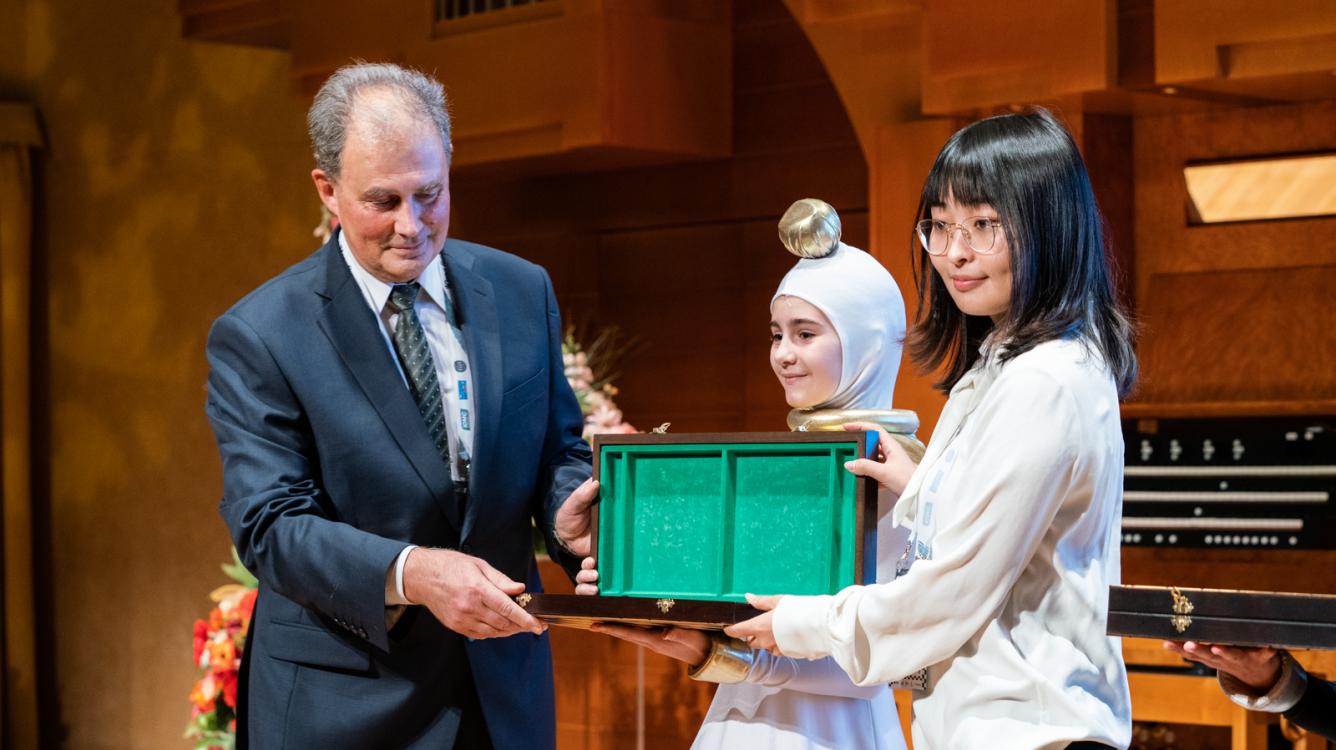
Women's World Chess Championship Takes Off Today
Today the first round of the 2018 Women's World Chess Championship starts in Khanty-Mansiysk, Russia. 64 players from 28 countries will be fighting in a knockout format to determine the new champion—and that might be for the last time.
The 2018 Women's World Championship was opened on Friday night in the concert and theater complex Ugra-Classic in the presence of the Governor of the Ugra region Natalia Komarova and FIDE President Arkady Dvorkovich.
In what was a relatively short ceremony, there were musicians playing accordion, domra and balalaika. A chamber orchestra played a mixture of famous melodies of the past, and local artists sang opera. (Our ever-traveling photographer was present!)
Beautiful (and short) opening ceremony in Khanty-Mansiysk gave start the last knock-out #WWCC ever organized by @FIDE_chess. After the welcoming speech by @advorkovich, women’s world champion Ju Wenjun picked Black in her and all other odd-numbered players’ first game. #ugrachess pic.twitter.com/ape4qKQbE7
— Maria Emelianova (@photochess) November 2, 2018
The top seed is the reigning world champion Ju Wenjun (2561, China). She has to defend a title she has only been holding for half a year, after her 2018 match with Tan Zhongyi (2527, China) had been delayed. Tan is the previous winner of the knockout world championship, held in early 2017 in Tehran, Iran.
Besides the two Chinese players, the field also includes former world champions Alexandra Kosteniuk (2551, Russia), Mariya Muzychuk (2533, Ukraine), Antoaneta Stefanova (2490, Bulgaria) and Anna Ushenina (2451, Ukraine).
Other favorites are Humpy Koneru (2557, India), Kateryna Lagno (2556, Russia), Anna Muzychuk (2555, Ukraine), Aleksandra Goryachkina (2536, Russia) and Valentina Gunina (2525, Russia).
Today the tournament starts. At the drawing of lots last night, Ju Wenjun picked Black for her first game, and for all other odd-numbered players’ first game.

Ju Wenjun picked a black queen, as shown by the chief arbiter.
At a press conference mid-October, the FIDE President determined by drawing of lots the starting numbers of four of the participants who have identical ratings and other additional criteria. Zhansaya Abdumalik (Kazakhstan) got 15, Nino Batsiashvili (Georgia) 16, Inna Gaponenko (Ukraine) 33 and Marina Guseva (Russia) 34.
The format is known, and similar to FIDE's biannual World Cups: each round consists of two classical games, and if needed, a rapid/blitz tiebreak on the third day. There are five of such rounds. The final will be played over four classical games, and is scheduled for November 19-23. The total prize fund is U.S. $450,000 with U.S. $60,000 going to the winner.
What's new this year is that all semi-finalists (except for the eventual winner) will qualify to a forthcoming Women's Candidates' Tournament, which is part of the new 2019-2020 cycle. This comes from a proposal from FIDE President Dvorkovich, unanimously supported at the FIDE Congress last month, to reshape the women's cycle to the example of the open cycle. This could be the last championship in knockout format.

The venue of the World Championship is the famous Ugra Chess Academy in Khanty-Mansiysk, which has hosted several World Cups and other chess events before. | Photo: Ugra Chess.
One odd regulation this year is that there will be zero-tolerance for arriving late at the games. Most tournaments work with a 15- or 30-minute time for players to arrive after that start of the round, but to the (unpleasant) surprise of the participants, chief arbiter Igor Bolotinsky announced zero-tolerance at the opening ceremony. (He even remarked that there was also zero-tolerance at the Batumi Olympiad, which isn't true.)
English commentary will be provided on the official website by former European champion Pavel Tregubov and two-time Russian champion and three-time Olympiad winner Alexander Morozevich.
Russian commentary comes from the well-known commentator, coach and analyst Sergey Shipov, former European champion and coach of the Russian national women’s team Evgeniy Najer, and two-time Ukrainian champion and well-known coach and commentator Evgenij Miroshnichenko.
While the "other" world championship will dominate our website in the coming three weeks (that's surely not a surprise to you!), our women's chess correspondent IM Jovanka Houska (@jovankahouska) will be providing news reports ever third day, at the end of each round.

Organ music at the start of the ceremony. | Photo: Maria Emelianova/Chess.com.

Human pawns presented the flags of the participating nations. | Photo: Maria Emelianova/Chess.com.

Speeches by officials. | Photo: Maria Emelianova/Chess.com.

Ju Wenjun and Tan Tan Zhongyi, the current and the previous world champion, sitting together. | Photo: Maria Emelianova/Chess.com.

FIDE President Arkady Dvorkovich. | Photo: Maria Emelianova/Chess.com.

A performance by local musicians. | Photo: Maria Emelianova/Chess.com.

An accordion musician in action. | Photo: Maria Emelianova/Chess.com.

And a final act with opera singers. | Photo: Maria Emelianova/Chess.com.

